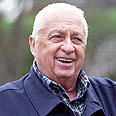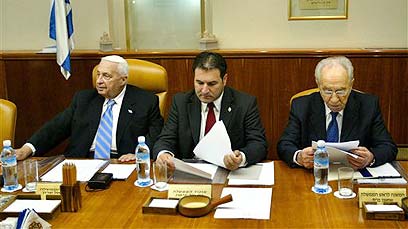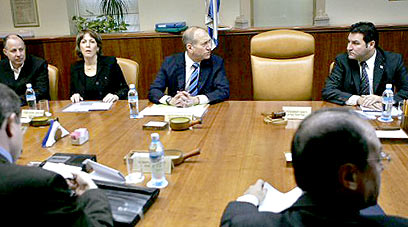
4 years on: Sharon is still missed
Haim Ramon, who founded Kadima with Sharon, sure that party is former PM's greatest success. Yossi Sarid and Daniela Weiss say he did only harm. Close adviser Asi Shariv recalls personal friendship, conversations about wives
Exactly four years ago, then Prime Minister Ariel Sharon was taken to Hadassah Ein-Kerem Hospital in Jerusalem after having a stroke. Since then, despite prayers and hope, he has remained in a coma. People close to him in the months before the stroke remembered the leader Sunday evening in a conversation with Ynet. But there are still those unable to forgive him for what he did during decades of public service.
Former Minister Haim Ramon, who joined Kadima when it was founded, said, "I certainly miss him. We had our ups and downs, sometimes I was with him, sometimes against. In his final years he made some very significant moves, overcame the second Intifada, disengaged from Gaza despite the difficulties this involved and despite his own biography, and thirdly, he set off a political bomb. A prime minister who made a move is remembered in the public consciousness. A prime minister who does three – is remembered three times as much."
Ramon does not fantasize too much about what might have been if Sharon had remained prime minister till today. Neither does he amuse himself with the possibility that Sharon may still return. "I'm a realist, I would be happy if he would get better, and I imagine his family feels the same. We hope for the best, but we can't expect more than that. I guess that if he was still serving as prime minister, we would be in the process of converging onto the main settlements in order to preserve Israel as a Jewish and democratic state."

Sharon (L) with Shimon Peres at a government meeting (Photo: AP)
And what about the party that Sharon founded? According to Ramon, Kadima is still Sharon's greatest success. "From the moment it was established, they tried to prophesy its demise, and the more they prophesied, the greater its achievements. Even today, despite the crisis, Kadima is the only alternative to the Likud."

Sharon's empty chair following his stroke (Photo: AFP)
But contrary to the longing for Sharon in the center of the political spectrum, there are those on the Left and the Right that do not miss the time in which Sharon served as prime minister.
Former Minister Yossi Sarid said: "The fact that he is in a coma doesn't change my opinion of him. I really can't say a single good thing about him. Sharon may be the forefather of sins in Israeli politics, both personally and in general. In his final days he tried, maybe out of reasons known only to him, to atone, but his sins are too grave."
Sarid could find some kind words to say about the former prime minister: "He had a sense of humor and he was very punctual… He knew how to suck up. Compared to Barak and Bibi (Netanyahu) he knew how to win people over. He had a kind of charisma that bought people. But not me."
Another person who doesn't miss Sharon is Daniela Weiss, former Kedumim Council head and one of the leaders of the Gush Emunim movement. According to Weiss: "This man caused a terrible catastrophe that will not be erased in a thousand years. Herod rebuilt the Temple, but he is still remembered in a negative light. I cannot remember Sharon's good due to the wrong he committed…If he hadn't fallen he would have continued with the disengagement. Could the fact that he fell into a coma be a sign from the heavens?"

The ambulance that took Sharon to hospital (Photo: AP)
Sharon's former media adviser and Israel's current Consul General in New York Asi Shariv, spoke of the time that has passed since the former PM's stroke: "The truth is it seems like much more than four years have passed. You look at what the country has been through and what everyone has been through – two wars, two governments, even the Kadima issue is back in the headlines."
Of Sharon's path, Shariv said, "He was first and foremost a person. Not everyone agreed with his political views, but there were people that really believed in him personally. His office wasn't a homogenous one. On January 4, I don't remember the disengagement or Operation Defensive Shield, but I remember the little things, conversations about our wives, his ability to recognize if one of us was in a bad mood and invite us to lunch, his ability to identify any mood. This is what I miss dearly."
Attila Somfalvi contributed to this report










